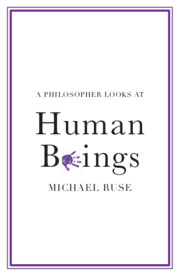Book contents
- A Philosopher Looks at Human Beings
- A Philosopher Looks at
- A Philosopher Looks at Human Beings
- Copyright page
- Dedication
- Contents
- Acknowledgments
- Introduction
- 1 The Status of Humans
- 2 Mechanism versus Organicism
- 3 Darwinian Evolution
- 4 Mechanism and Human Nature
- 5 Organicism and Human Nature
- 6 The Problem of Progress
- 7 Morality for the Organicist
- 8 Morality for the Mechanist
- Epilogue
- Bibliography
- Index
2 - Mechanism versus Organicism
Published online by Cambridge University Press: 20 May 2021
- A Philosopher Looks at Human Beings
- A Philosopher Looks at
- A Philosopher Looks at Human Beings
- Copyright page
- Dedication
- Contents
- Acknowledgments
- Introduction
- 1 The Status of Humans
- 2 Mechanism versus Organicism
- 3 Darwinian Evolution
- 4 Mechanism and Human Nature
- 5 Organicism and Human Nature
- 6 The Problem of Progress
- 7 Morality for the Organicist
- 8 Morality for the Mechanist
- Epilogue
- Bibliography
- Index
Summary
Two root metaphors help us to interpret the world. The older, going back to the Greeks, sees the world as an organism, organicism. The younger, which came into play during the Scientific Revolution, sees the world as a machine, mechanism. The former sees the superiority of humans as part of the natural development of an organic world. The latter thinks that if science is to show humans superior, then it must show how and why. Prominent mechanists include Charles Darwin, the father of evolutionary theory through natural selection. Prominent organicists, all owing a debt to the German Romantic philosopher Friedrich Schelling, include Herbert Spencer, Henri Bergson, and Alfred North Whitehead.
- Type
- Chapter
- Information
- A Philosopher Looks at Human Beings , pp. 21 - 47Publisher: Cambridge University PressPrint publication year: 2021

